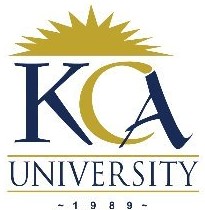
UNIVERSITY EXAMINATIONS: 2010/2011
THIRD YEAR STAGE EXAMINATION FOR THE DEGREE OF BACHELOR
OF SCIENCE IN INFORMATION TECHNOLOGY
BIT4301: ADVANCED OPERATING SYSTEMS
DATE: JUNE 2011 TIME: 2 HOURS
INSTRUCTIONS: Answer question ONE and any other TWO questions
Question One
a) Briefly explain the meaning of the following concepts
i. User space (1 Mark)
ii. Virtual memory (1 Mark)
iii. Cache (1 Mark)
iv. Process control block (1 Mark)
b) Give two differences between bios and kernel as used in operating systems. (2 Marks)
c) A process goes through a series of discrete states transitions. State and explain three state
transitions that cannot occur. Use a diagram to illustrate your answer (5 Marks)
d) State and explain any four responsibilities of operating systems in managing processes (4 Marks)
e) Hardware and software are implemented to exploit the principle of locality. State and explain two
principles locality (4 Marks)
f) briefly explain four elements of process image (4 Marks)
g) Briefly explain three reasons why threads are used in designing operating systems (3 Marks)
h) Describe four conditions that must hold for deadlock to occur in operating systems (4 Marks)
Question Two
a) Briefly explain the meaning of the term ‘virtual file system’ (2 Marks)
b) Multi-threading can be implemented in two different levels . State and Explain each of these
levels (4 Marks)
c) Describe four situations when CPU scheduling decisions may take place (4 Marks)
d) Explain the meaning of the term ‘protection’. (2 Marks)
e) Explain three protection mechanisms performed by operating systems (2 Marks)
f) Describe the term ‘ spawning processes’. (2 Marks)
g) Describe three elements of a thread state. (2 Marks)
h) Briefly describe the term ‘dispatch latency’ (2 Marks)
Question Three
a)State and explain two main operations applicable to all stacks (4 Marks)
b)State and explain and explain two regions of system memory (4 Marks)
c)Define the term ‘deadlock’. Briefly explain four strategies for dealing with deadlocks adopted in
operating system (5 Marks)
d)State and explain four factors that are considered by scheduler when making decision of
scheduling. (4 Marks)
e)Describe three Scheduling strategies that are adopted by scheduler in operating systems(3 Marks)
Question Four
a) Briefly explain the meaning of the following linux commands
i. kill 78689 (2 Marks)
ii. ps –au root (2 Marks)
iii. Virtual machine (2 Marks)
b) Distinguish between real time systems and batch systems. Give one application example for
each of them. (4 Marks)
c) With the aid of diagram describe three models of implementing threads. (6 Marks)
d) Describe the algorithm of Run() scheduler method (4 Marks)
Question Five
a) Using examples, describe the any three types of operating systems (3 Marks)
b) Explain the meaning of the following concepts in the context of operating systems.
i.Operating systems security (2 Marks)
ii.Starvation (2 Marks)
c) Briefly describe any three operating systems security goals. (3 Marks)
d) Describe four methods of Protecting general objects in operating systems (4 Marks)
e) State and explain two main types of distributed operating systems (4 Marks)
f) Briefly explain any two Distributed operating systems functions (2 Marks)
